Looking to save money on fuel? Look to these vehicles
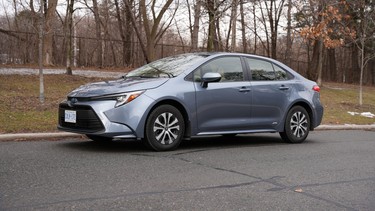
Article content
Whether you’re driven by environmental concerns or budget constraints, it doesn’t hurt to use less fuel and save a few bucks in the process. These days, there are fuel-efficient options in every segment, from small cars and SUVs to pickup trucks.
Advertisement 2
Article content
Here’s a look at the most fuel-efficient hybrids you can buy in every segment where they exist, which we’ve ranked based on the litres per 100 kilometres (L/100 km) measurement for combined driving as outlined in Natural Resources Canada’s 2023 Fuel Consumption Guide. Note we’re looking at conventional or self-charging hybrids here, not plug-in hybrids (PHEVs). Conventional hybrids can’t go for long on electric power alone like PHEVs can, but they recharge their batteries by recovering energy while you drive, which improves fuel efficiency without the need to plug in to an electrical outlet or charging station. Toyota and its luxury brand Lexus have made self-charging hybrids a significant portion of their fuel-saving strategy, so it’s no surprise to see those brands dominate this list.
Advertisement 3
Article content
-
![Used Guide: 5 tips before you buy that used hybrid]()
Used Guide: 5 tips before you buy that used hybrid
-
![Top 10 Affordable Plug-In Hybrid Cars (PHEVs) in Canada for 2022]()
Top 10 Affordable Plug-In Hybrid Cars (PHEVs) in Canada for 2022
Most efficient hybrid car: Toyota Corolla Hybrid
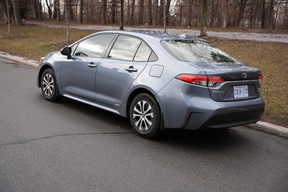
The Toyota Corolla Hybrid is the most efficient hybrid car on the Canadian market, but only when you get it in its base LE front-wheel drive (FWD) version, where it consumes 4.7 L/100 km combined. If you opt for all-wheel drive (AWD), which is available on LE and standard on every other trim, that figure goes up to 4.9 L/100 km combined. In either case, the Corolla Hybrid’s powertrain generates 121 horsepower from its combination of a 1.8-litre four-cylinder engine and electric motor.
Fuel economy (L/100 km): 4.4 city / 5.1 highway / 4.7 combined
Article content
Advertisement 4
Article content
Canadian starting MSRP: $29,100 (including $1,760 destination charge)
Comprehensive warranty: 3 years / 60,000 km
Powertrain warranty: 5 years / 100,000 km
Hybrid components warranty: 8 years / 160,000 km (Battery 10 years / 240,000 km)
Alternatives: The next closest car on combined fuel economy is the Hyundai Elantra Hybrid. It averages 4.7 L/100 km combined but has a higher fuel figure than the Corolla Hybrid for city driving and a lower one on the highway, so consider the Elantra instead if you do a lot of long-distance cruising. You could also stay within the Toyota family and opt for the new Prius, which is sporting a great new look and averages 4.8 L/100 km combined, including all-wheel drive.
Compare the specs of similar hybrid cars
Advertisement 5
Article content
Most efficient hybrid small SUV: Kia Niro Hybrid

The Kia Niro has been redesigned for the 2023 model year, and perhaps the most impressive thing about that revamp is the hybrid version of this small crossover boasts the overall best fuel consumption figure on the Canadian market among non-plug-in vehicles at 4.4 L/100 km combined. Note this only applies to the most fuel-efficient version with 16-inch wheels; other versions average 4.8 L/100 km combined, which is still a great figure. The updated Kia Niro Hybrid uses a 1.6-litre four-cylinder engine and electric motor that together produce 139 hp and 195 lb-ft of torque.
Fuel economy (L/100 km): 4.5 city / 4.4 highway / 4.4 combined
Canadian starting MSRP: $32,583 (including $2,449 destination charge)
Advertisement 6
Article content
Comprehensive warranty: 5 years / 100,000 km
Powertrain warranty: 5 years / 100,000 km
Hybrid components warranty: 8 years / 150,000 km
Alternatives: There are plenty of hybrid options among small SUVs. Most of them are compacts, which is a size class above the subcompact Niro. Among these, the best performers on fuel consumption are the Toyota RAV4 Hybrid, which comes with standard AWD and averages 6.0 L/100 km combined; the Ford Escape Hybrid, which NRCan says averages 6.0 L/100 km combined whether you choose FWD or AWD; the Kia Sportage Hybrid AWD, averaging 6.2 L/100 km combined; and the Hyundai Tucson Hybrid AWD at 6.4 L/100 km combined.
Compare the specs of similar hybrid small SUVs
Most efficient hybrid three-row SUV: Kia Sorento Hybrid
Advertisement 7
Article content
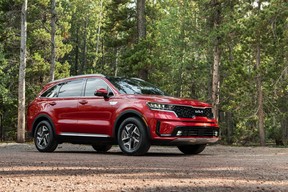
Though the playing field will expand over the next couple of years among hybrid three-row SUVs with the Mazda CX-90 and Toyota Grand Highlander about to enter the fray, currently hybrid selection in this segment is limited. For the best outright fuel efficiency, look to the Kia Sorento Hybrid, which comes with standard AWD and averages 6.6 L/100 km combined. You’ll get 227 hp and 258 lb-ft of torque from its 1.6-litre turbocharged four-cylinder engine and electric motor combo. The Sorento’s third row is relatively limited on space, though, and is better suited to occasional rather than daily use.
Fuel economy (L/100 km): 6.4 city / 7.0 highway / 6.6 combined
Canadian starting MSRP: $40,183 (including $2,549 destination charge)
Advertisement 8
Article content
Comprehensive warranty: 5 years / 100,000 km
Powertrain warranty: 5 years / 100,000 km
Hybrid components warranty: 8 years / 150,000 km
Alternatives: Until the Toyota Grand Highlander Hybrid arrives, the not-grand version of the Toyota Highlander Hybrid is slightly roomier in the rear than the Sorento and averages 6.7 L/100 km combined with standard AWD. For those who need more third-row space, the Ford Explorer Hybrid is an option, though it’s thirstier at an average of 9.6 L/100 km combined with standard AWD.
Compare the specs of similar hybrid three-row SUVs
Most efficient hybrid luxury car: Lexus ES 300h
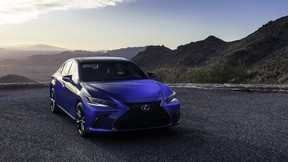
On the luxury side of the market, conventional hybrids are fewer and farther between. That could be because drivers in this space who care about fuel efficiency can likely afford PHEVs, which are more expensive but allow for roughly 30 to 50 kilometres of fully electric driving. You’ll find Lexus holding down the fort in the hybrid premium space. Among cars, the Lexus ES 300h midsize sedan is the most fuel-efficient hybrid you can buy, powered by a 2.5-litre four-cylinder engine and electric motor which together produce 215 horsepower while consuming 5.3 L/100 km combined on average.
Advertisement 9
Article content
Fuel economy (L/100 km): 5.5 city / 5.2 highway / 5.3 combined
Canadian starting MSRP: $56,632 (including $2,205 destination charge)
Comprehensive warranty: 4 years / 80,000 km
Powertrain warranty: 6 years / 110,000 km
Hybrid components warranty: 8 years / 160,000 km (Battery 10 years / 240,000 km)
Alternatives: If you really want a luxury car that’s a hybrid and not a PHEV, your other options are a larger sedan in the Lexus LS 500h, which averages 9.2 L/100 km combined, or the Lexus LC 500h sports car, which consumes 8.1 L/100 km combined.
Compare the specs of Lexus’ hybrid cars
Most efficient hybrid luxury SUV: Lexus NX 350h or Lexus UX 250h
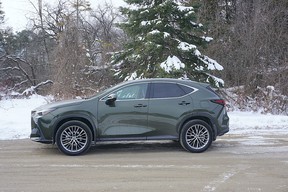
Here’s Lexus again, dominating the hybrid game in the luxury space among SUVs as well. Here, we have a tie: you can opt for either the subcompact Lexus UX 250h or the compact Lexus NX 350h, and in either case you’ll see a combined fuel consumption average of 6.0 L/100 km combined. The smaller UX is sold only as a hybrid with standard AWD, powered by a 181 hp hybrid system that matches a 2.0-litre four-cylinder engine with electric motors. Opt for the NX and you’ll get 240 hp from a 2.5-litre four-cylinder matched with electric motors, standard AWD, and a Canadian-built vehicle assembled in Cambridge, Ontario.
Advertisement 10
Article content
Fuel economy (L/100 km): UX 5.7 city / 6.2 highway / 6.0 combined; NX 5.7 city / 6.4 highway / 6.0 combined
Canadian starting MSRP: UX $45,532; NX $54,482 (including $2,205 destination charge)
Comprehensive warranty: 4 years / 80,000 km
Powertrain warranty: 6 years / 110,000 km
Hybrid components warranty: 8 years / 160,000 km (Battery 10 years / 240,000 km)
Alternatives: The story is the same among SUVs: if it’s a hybrid you want, it’s a Lexus you’ll get. If you need something larger than the two options listed here, the newly redesigned Lexus RX 350h offers two roomier rows of seating and a combined average of 6.5 L/100 km.
Compare the specs of Lexus’ hybrid SUVs
Most efficient hybrid compact/mid-size pick-up: Ford Maverick
Advertisement 11
Article content
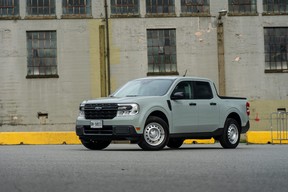
There’s next to no selection among small pick-ups where hybrid power is concerned, but perhaps the Ford Maverick is all the choice we need. Its standard hybrid powertrain matches electric power with a 2.5-litre four-cylinder engine for a total combined power output of 191 horsepower. More importantly, this setup gives the Maverick a combined fuel consumption average of 6.4 L/100 km. Note this setup is only offered in FWD; to get AWD, you need to drop the hybrid and upgrade to a gas-only powertrain.
Fuel economy (L/100 km): 5.8 city / 7.1 highway / 6.4 combined
Canadian starting MSRP: $33,295 (including $2,195 destination charge)
Comprehensive warranty: 3 years / 60,000 km
Powertrain warranty: 5 years / 100,000 km
Advertisement 12
Article content
Hybrid components warranty: 8 years / 160,000 km
Alternatives: For electrified small trucks? There aren’t any. If you want to even begin to approach the Maverick on fuel economy, you’ll have to look to the Jeep Gladiator EcoDiesel with its combined average of 9.8 L/100 km combined (which happens to be the same as the AWD gas-powered Maverick).
Most efficient hybrid full-size pick-up: Ford F-150 Hybrid
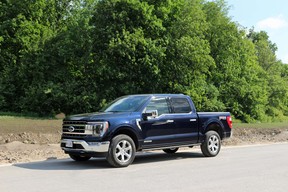
Half-ton pick-ups can be expensive to run, so an option that saves on fuel is welcome. The Ford F-150 Hybrid is currently the most fuel-efficient of the few that are on offer at 10.1 L/100 km combined, or 10.4 if you opt for AWD. The 3.5-litre V6 with hybrid power produces 430 hp and 570 lb-ft of torque and is available to Canadian buyers starting at the Lariat trim. The fact that the hybrid battery can power small tools and appliances doesn’t hurt, either.
Advertisement 13
Article content
Fuel economy (L/100 km): 10.1 city / 10.1 highway / 10.1 combined
Canadian starting MSRP: $76,460 (including $2,195 destination charge)
Comprehensive warranty: 3 years / 60,000 km
Powertrain warranty: 5 years / 100,000 km
Hybrid components warranty: 8 years / 160,000 km
Alternatives: There are only two other hybrids on the full-size pick-up market. The Toyota Tundra Hybrid 4WD has a higher combined average of 11.7 L/100 km, and the Ram 1500 with the eTorque mild hybrid system averages 10.8 L/100 km combined or 11.0 with 4WD. Neither offers external power points in the same way the Ford does. Outside of these options, you’re looking to diesels.
Most efficient hybrid minivan: Toyota Sienna

Looking for the most efficient people-mover you can find? Look no further than the Toyota Sienna. With its 245 hp standard hybrid powertrain that matches a 2.5-litre four-cylinder engine with electric power, the Sienna can move up to eight passengers while averaging 6.6 L/100 km combined, or 6.7 L/100 km when AWD is equipped.
Advertisement 14
Article content
Fuel economy (L/100 km): 6.6 city / 6.5 highway / 6.6 combined
Canadian starting MSRP: $45,434 (including $1,930 destination charge)
Comprehensive warranty: 3 years / 60,000 km
Powertrain warranty: 5 years / 100,000 km
Hybrid components warranty: 8 years / 160,000 km (Battery 10 years / 240,000 km)
Alternatives: The Sienna is the only conventional hybrid minivan on the market. The closest alternative is the Chrysler Pacifica Hybrid, which is actually a PHEV; it has an overall average of 2.9 Le/100 km combined when its 51 kilometres of electric-only range comes into play and a combined average of 8.0 L/100 km when running in hybrid mode. It also doesn’t come with AWD. Pricing is more expensive than the Sienna, but the Pacifica Hybrid qualifies for federal EV rebates, so it’s wise to weigh final pricing and your driving habits carefully before deciding between the two.
Stay connected with us on social media platform for instant update click here to join our Twitter, & Facebook
We are now on Telegram. Click here to join our channel (@TechiUpdate) and stay updated with the latest Technology headlines.
For all the latest Automobiles News Click Here



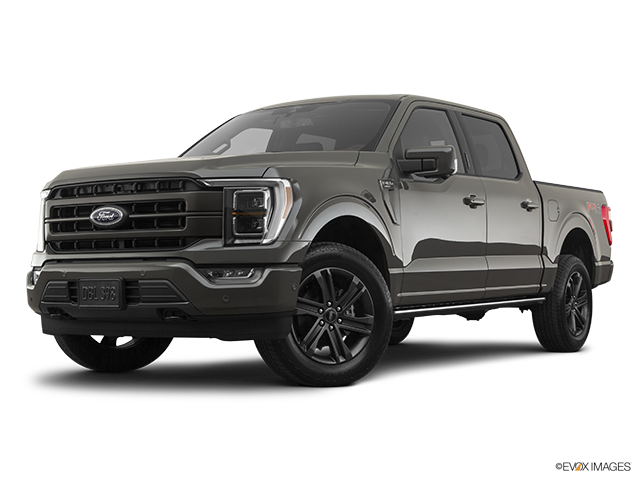
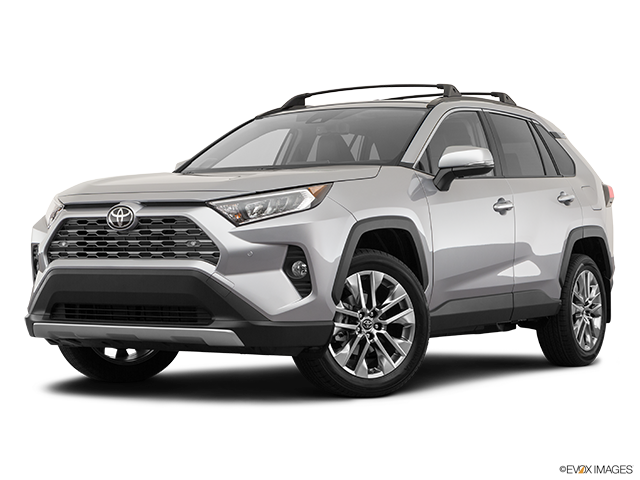
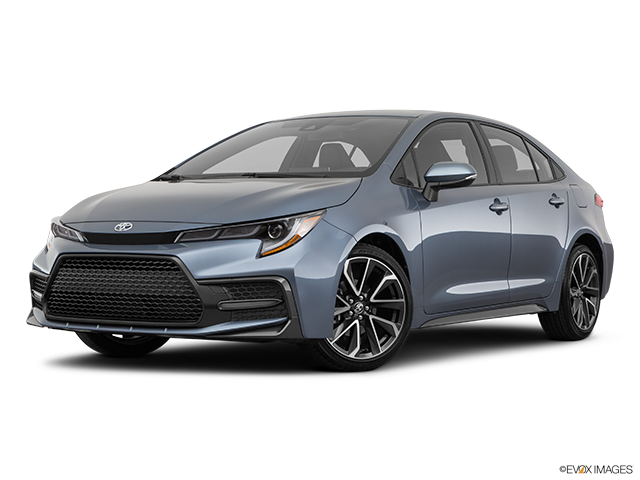
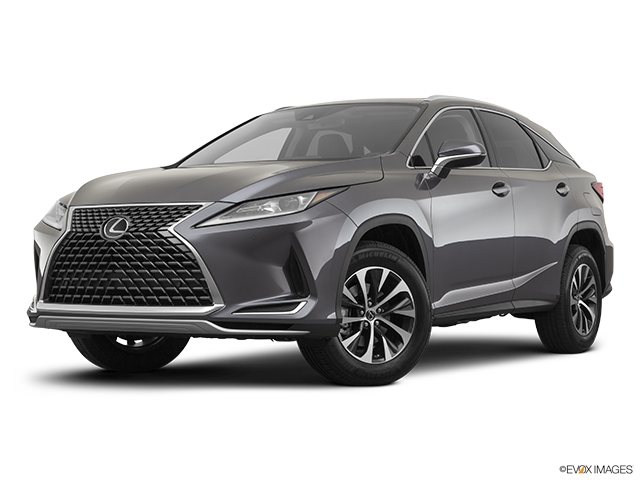
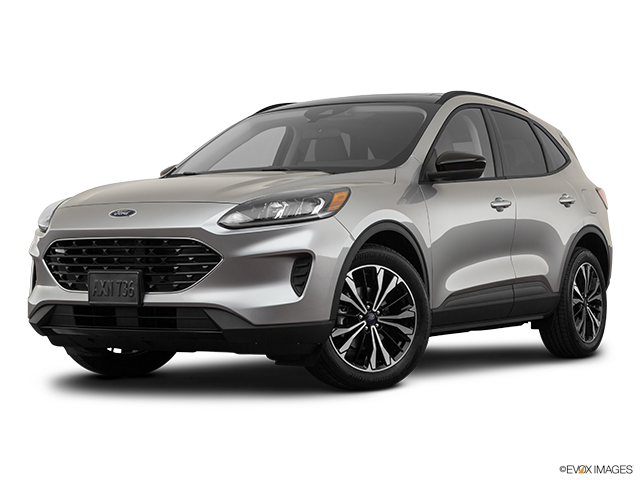

Comments
Postmedia is committed to maintaining a lively but civil forum for discussion and encourage all readers to share their views on our articles. Comments may take up to an hour for moderation before appearing on the site. We ask you to keep your comments relevant and respectful. We have enabled email notifications—you will now receive an email if you receive a reply to your comment, there is an update to a comment thread you follow or if a user you follow comments. Visit our Community Guidelines for more information and details on how to adjust your email settings.
Join the Conversation